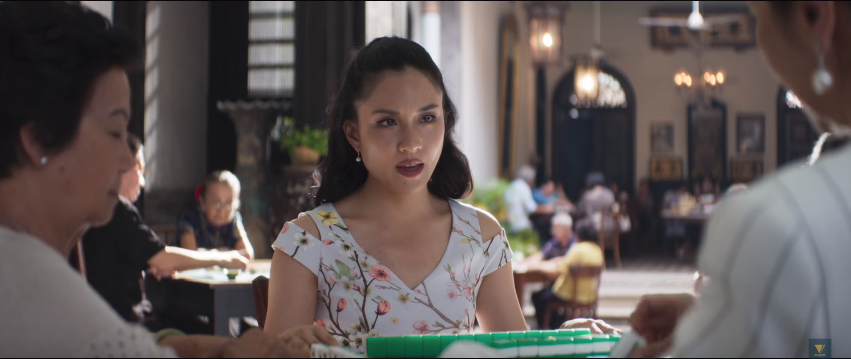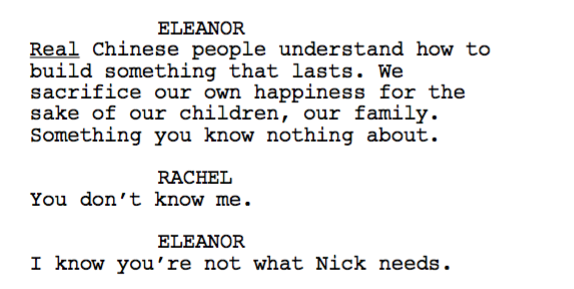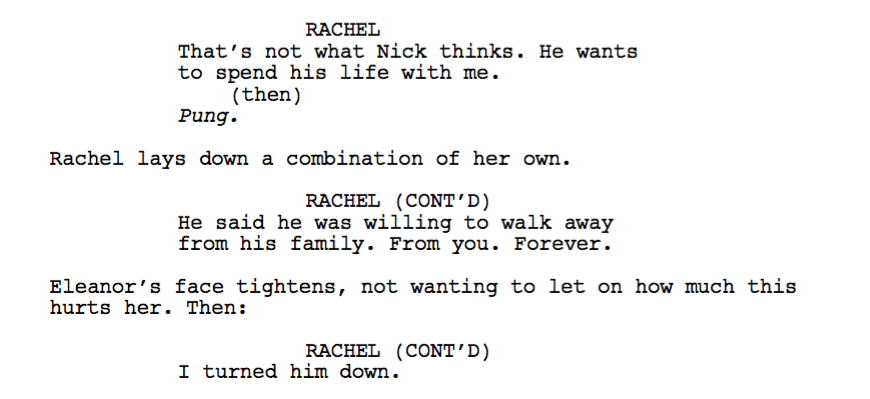I’m back. Thanks everyone for bearing with the small hiatus that the column took for the past few weeks. Who knew being overworked and sick wasn’t a good time? For our return, let’s take a look at the biggest movie of the summer, and how a pivotal scene operates in many emotional levels. -Jorge
Warning! Crazy Rich Spoilers ahead!

There are many things to admire in Crazy Rich Asians. Consider theway it reinvents a rom-com formula that seemed to have gotten stale. Or its historic all-Asian cast, something that hadn’t happened in an American movie in over two decades. Big themes of family, legacy, tradition and culture running through its veins. And Michele Yeoh’s stare. One scene in the movie encompasses all of these traits.
The mahjong game, the final confrontation between Rachel (Constance Wu) and Eleanor (Michelle Yeoh) was not in the original novel; it was written specifically for the film. It's one of the most emotionally powerful moments of the movie, where Rachel finally gives up the fight and backs away from her fiancée and his family that clearly doesn’t want her there. But in the scene, Rachel reclaims power and control in many levels at the same time. Let’s take a look at the script to see how the most tense movie moment of the summer was crafted. Sorry, Mission Impossible...
Crazy Rich Asians
Screenplay by: Peter Chiarelli and Adele Lim
Based on the novel by: Kevin Kwan
By this point of the movie, Nick (Henry Golding) has decided he will give up his family to be with Rachel. He has proposed to her in the airplane, before she heads back home. But we never see her say yes. In the next scene, Rachel arrives at a mahjong parlor to meet Eleanor. We assume she is about to tell her about it. And she is going to, just not in the way we expect her to.
The scene brings together so many of the themes that have been in the background of the film into a single space: the importance of family in Chinese identity, the difference between nationals and immigrants, traditions that are passed onto generations. Rachel consciously chooses this meeting place because she knows its meaning. As the script tells us, “it’s a FLUID, RHYTHMIC RITUAL -- the staccato stacking of tiles, the ballet of stacks being formed and moved like clockwork. Eleanor is surprised to see Rachel folds in effortlessly with the old timers."
The game of mahjong continues at all times as the scenes plays out. It’s an essential part of it. What is being played reflects Rachel and Eleanor’s conversation. It’s a strategy. It’s a laying of the tiles. It’s one and the same.

***

The scene operates in many different emotional levels. Things are being said explicitly; comments that had been quietly simmering are brought to light. Eleanor expresses once again her disdain over Rachel’s Americanness. She will never be enough for Nick. But now Rachel is equally as blunt to her. There’s a back and forth, instead of one-sided insults.
But it’s also about what is not being said. In the middle of the scene, Rachel reveals Nick’s proposal. That is new information to Eleanor. But she also reveals that she turned him down. That is new information to the audience.

Rachel regains her power, a power she actually always held from the start of the scene. She reveals to Eleanor that she left Nick because she didn’t want him to be unable to forgive his own family for making him choose between her and them in the first place. He was ready to leave them, but she knows better. She tells Eleanor that when he has a family in the future, she should remember it was because of her. She won. She let Eleanor win.
And that mahjong game that been going on at the same time, seamlessly and ritualistically? She also let Eleanor win. I must confess I am not familiar with the specific rules of mahjong (I’m sure this scene is even more immediately resonant to those who are), but that’s part of its beauty. It’s clear that the moment Rachel reveals her game, Eleanor knows she had everything to win. Not only in mahjong, but outside the parlor as well.

There’s a lot more to say about Crazy Rich Asians. There’s a glossy, shiny, beautiful package that contains plenty of emotionally resonant drama inside, and honestly we don’t get enough of those. We’ve gotten plenty of the gloss, and not much of the emotion. But in just one scene, the movie managed to package a bigger punch that could single-handedly fill the void left by the rom-com genre over a decade. All it took was a wedding across the world, a culture eager for representation, some mahjong tiles, and the coldest stare an actress could conjure. Funny enough, that’s also my wedding registry.